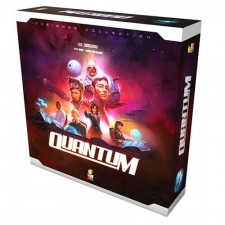Quantum Review
on Nov 12, 2015
The age of the token is ending. The age of the mini is upon us. You can see it on the internet. You can feel it on the table. The pendulum of gamers’ tastes is swinging back from its Euro peak toward Ameritrash and will hopefully settle at a hybrid apex, but one game is bucking this trend, or at least altering its trajectory. Passport Game Studios’ Quantum dares us to imagine dice as starships blasting across the galaxy, propelling players toward interplanetary domination. And it works.
How can dice be spaceships? The same way cubes can be infected people or trade goods for gamers who didn’t buy the appropriately-shaped add-ons for their crowdfunded purchase. They work the same way dice represent miners on the moon or country-wide policies, and while each of the four player mats does have unique art for the six different ship types, the dice only differ in color. A production choice to save the exponential expense of custom sculpts and a larger box to be sure, but a choice that brings something else to the table: a streamlined strategic essence.
Each vessel’s number is its combat and movement value, with the low number winning battles and attackers winning ties, so players know the battlefield at a glance, with no need to consult a table or codex. Each ship has a special ability that can be used once per turn, and each player gets three total actions. The function of the game is easy to learn, but its novel twist on conquest forces players to find inventive ways to use their limited options.
Quantum’s goal is straightforward: the game is won when a player places all six of their Quantum cubes on the board, a maximum of one per planet. It’s not conquest or expansion in the usual sense because cubes can’t be destroyed once placed, so there’s no base to defend or territory to claim, making players flush antiquated notions of front lines and supply chains in favor of efficient movement, combined arms and subtle advances. Every player’s empire is laid bare on the table, so winning involves disguising your plan until the last possible moment and managing the inherent gamble of the fleet’s true nature.
Dice may fly through space and blast each other to bits, but they can’t deny their soul. The game justifies this by its namesake, a variant of quantum mechanics, the science of things we can’t yet accurately observe, and the science fiction, the convenience of things we don’t feel like explaining. Players “roll†their starting fleet, and ships can change type either through destruction or the player using an action to roll again, creating a unique universe where manufacturers spit out random creations and admirals remake their fleets by chance.
Brilliant or frustrating? Thematic or chaotic? Like the subatomic components of our universe, Quantum is a bit of both. But players who remain focused on the game’s goal can use these random pieces to craft a win, and the game aids them via upgrades won by victory in battle or cube position on a planet. Each world has a value that must be met by a combination of ships to enable cube construction, so players must consider more than a craft’s power or speed when employing their fleet. Dice-fueled combat and manufacturing requires constant shifting of the means while keeping the end clearly in sight.
The game aids shrewd players, offering upgrades and one-time use cards as rewards for success in battle or planetary cube placement, powers that can mitigate Quantum’s randomness and provide a variety of enhancements regardless of whether players pursue the path of war or of maneuver. Cubes and cards can also be earned by maximizing a player’s Dominance die through battle or their Research die through action, allowing a lateral path to victory or technological advancement, and making full use these two non-ship dice is the key to springing an unforeseen win.
Games take place on a modular map, each square tile representing a planet and nine movement spaces around it. Some worlds can hold more than one cube, though each player can only place one on a particular globe, and Quantum has several map layouts designed for different player counts. The makeup of the galaxy determines the gameplay, and most setups foster a good mix of open space and forced conflict, but akin to a collapsing star, high player counts combined with narrow maps result in frequent collisions and drawn-out, repetitive gameplay as opposing fleets collide and explode, all battling for the few worlds in the middle of the map.
Quantum can offer a crowded space full of randomly-generated spacecraft, but like orbiting electrons, these collisions are rare, and the majority of games result in a constantly-shifting strategic experience where ships not only don’t survive contact with the enemy but rarely endure their own admiral’s whims, changing as often due to success as to failure, and players who can harness this chaos will find a rewarding game experience that yields a universe worth visiting again and again.

 Customer Support
Customer Support  Subscribe
Subscribe 




 Account
Account  Wishlist
Wishlist 

